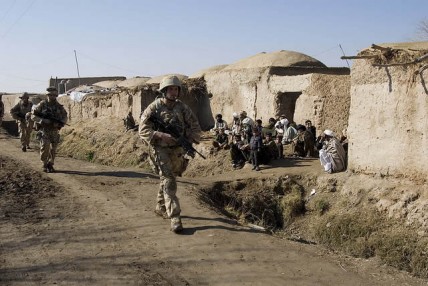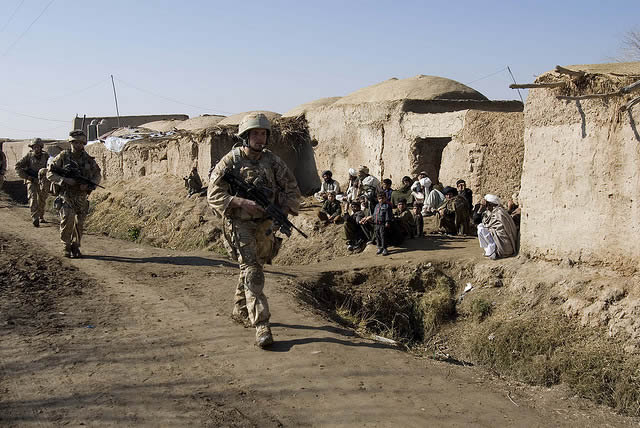
British Royal Marines in Afghanistan. Photograph by ISAF/James Elmer
By the time British forces pull out of Afghanistan in 2014 almost every member of the army will have been deployed either there, or in Iraq. But for those soldiers coming home, the stress may be far from over.
Violent Veterans, the latest offering from BBC’s File on Four, explores the issues faced by those leaving the forces. The topic has been well covered, but File on Four made it personal with lots of good case studies.
New research reveals that one in eight soldiers admitted to having committed a violent act since leaving the army and in 30% of those cases the act was against a family member.
Reporter Jane Deith talks to ex-service personnel, psychologists and victims of violence. Through a series of interviews she stitches together a detailed tableau of a vulnerable section of society, a population as potentially dangerous to others as they are to themselves.
Amanda Horley tells her story to Deith. Her best friend Judith Garnett was shot three times, at close range by a man she had looked after since he was a child.
The man was 24 year old Aaron Wilkinson. He had signed up young to the Territorial Army and was called up to Afghanistan. His introduction to military life was jarring: almost as soon as he was helicoptered into the country his platoon was under attack. He saw three Afghan soldiers blown up and was hit by a piece of shrapnel.
When he returned home it was clear his experience had affected him deeply. But things came to a head when, after a minor altercation with Judith, Aaron took his shotgun and shot his carer three times.
At his trial it was revealed that Aaron had undiagnosed Asperger Syndrome, an issue which had not been picked up when he joined the TA. On his release from the army a service doctor had also diagnosed him with Post Traumatic Stress Reaction (PTSR). Different from Post Traumatic Stress Disorder, PTSR can lead to anxiety disorders, depression or can reverse itself of its own accord.
Despite the army doctor’s diagnosis Aaron was sent on his way with little support or checks. Faced with the reality of civilian life his PTSR developed into PTSD, an illness characterised by flashbacks, emotional detachment and, often, violence.
Aaron’s legal team argued the combination of Asperger’s and PTSD meant he was not in control of his actions when he killed Judith. The jury agreed finding him not guilty of her murder, but guilty of manslaughter on diminished responsibility.
The MoD refused to comment on the case but in a statement said it’s absolutely committed to helping improved the mental health of the Armed Forces saying ‘we are examining a number of ways to develop mental health support for the Armed Forces, including the use of screening and surveillance techniques. We will ensure that whatever new measures are introduced they are appropriate and beneficial for the individual and the Armed Forces as a whole.’
Psychological research
Forensic psychologist Deirdre MacManus was doing research into men who had committed violent crimes when she started to notice a pattern of men having returned from combat in Afghanistan and Iraq. Intrigued by the pattern she wanted to know if this violence was a direct consequence of their experience in combat.
She ran a survey asking those who had been on deployment, if, since leaving the army, they had got angry and hit someone. Almost 13% said yes. Comparing her results she found that those that had performed a combat role while deployed registered twice as likely to display violent behaviour than those that hadn’t.
A third of those that reported violence said it occurred within a family setting.
MacManus did not ask her subjects to give reasons why they might have acted violently. She does however mention ‘The Invincibility Complex’, a theory that experiencing trauma makes a person more likely to take up risky behaviour. The psychologist notes that alcohol misuse can be an issue amongst army veterans.
A ticking time bomb
With those struggling to deal with their experiences of combat, it can be those closest to them that suffer the consequences of misplaced anger and aggression. SSAFA, the official armed forces charity, said it deals with around 400 cases of domestic violence a year.
Deith interviews one ex-army officer who admits to having to sit on his hands to stop himself from attacking his wife. Some are less restrained.
However, the Royal British Legion argues that it is a false assumption that going to war makes people more likely to behave violently in their home life.
Lord Dannatt, who was head of the army between 2006 and 2009, agrees that the pressure of intense military tours take their toll.
‘It doesn’t surprise [me], obviously to an extent it disappoints me… This is a problem that has got to be recognised, and it’s a problem that has got to be addressed and dealt with,’ he told Deith.
Last year the MoD launched a campaign called ‘Don’t Bottle It Up’, one of a number of efforts to encourage service personnel to talk about their worries.
Another programme, ‘TRIM- trauma risk management’, involved training some members of a unit to look for signs of stress in their colleagues.
For those leaving Afghanistan there is also a programme of decompression, where troops travel home via a 2 day trip in Cyprus, with de-brief sessions and time to relax. But, Lord Dannatt recognises, talking about mental illness can be seen as a sign of weakness amongst proud troops.
There is also an issue of confidentiality. The army’s Welfare Service offers troops and their families support. However counselors are made up of civilians and military personnel, leading to fears that complaints or worries could get back to military bosses.
File on Four’s forty minute documentary provides an emotional insight into the complexities of dealing with scarring emotional trauma.
As those in the Armed Forces continue to face untold traumas during service, only time will tell if the MoD’s programmes are adequate to deal with the emotional fall-out of combat. Or if more civilian casualties will pay a price.
Listen to the BBC’s File on Four: Violent Veterans here.




